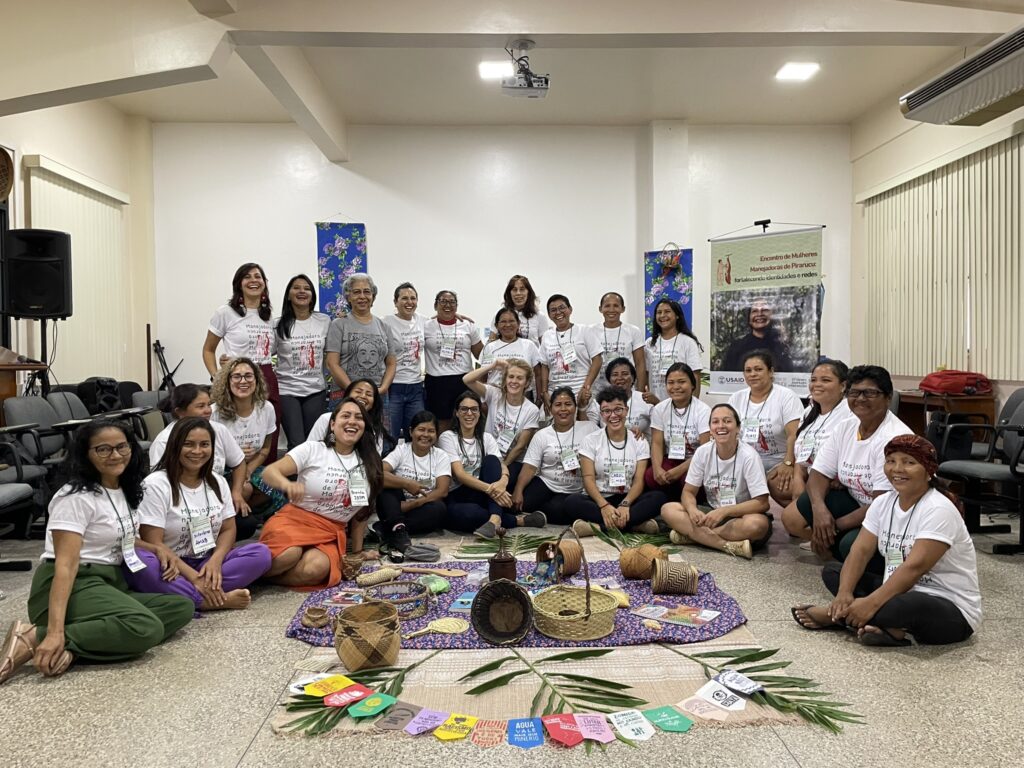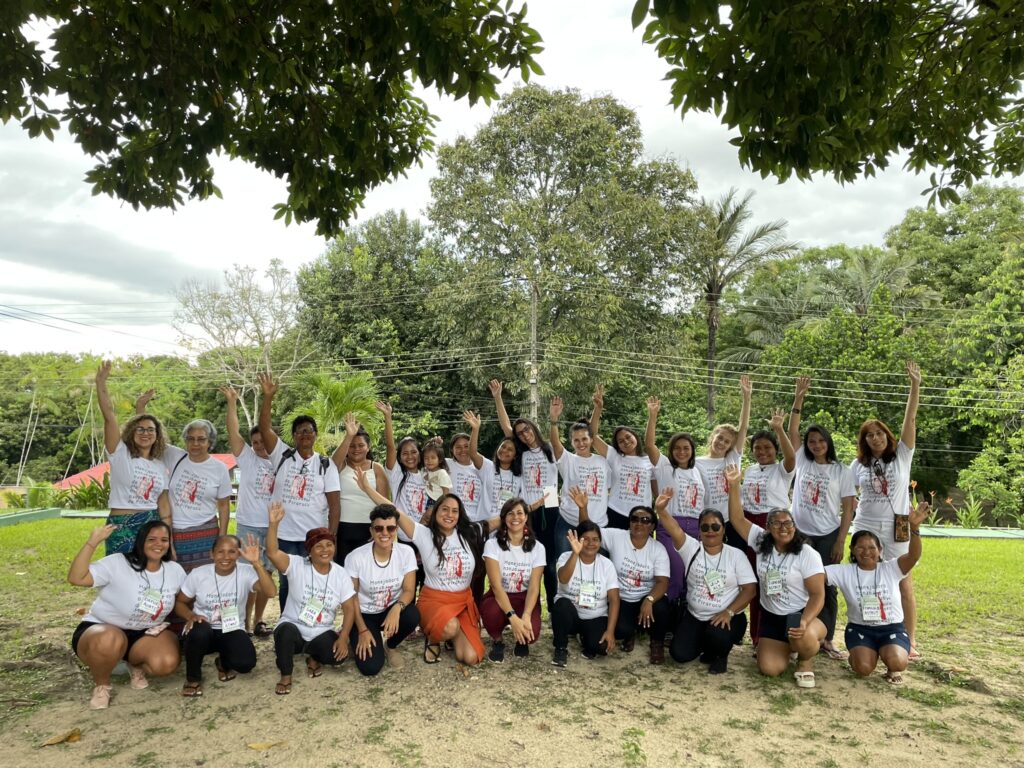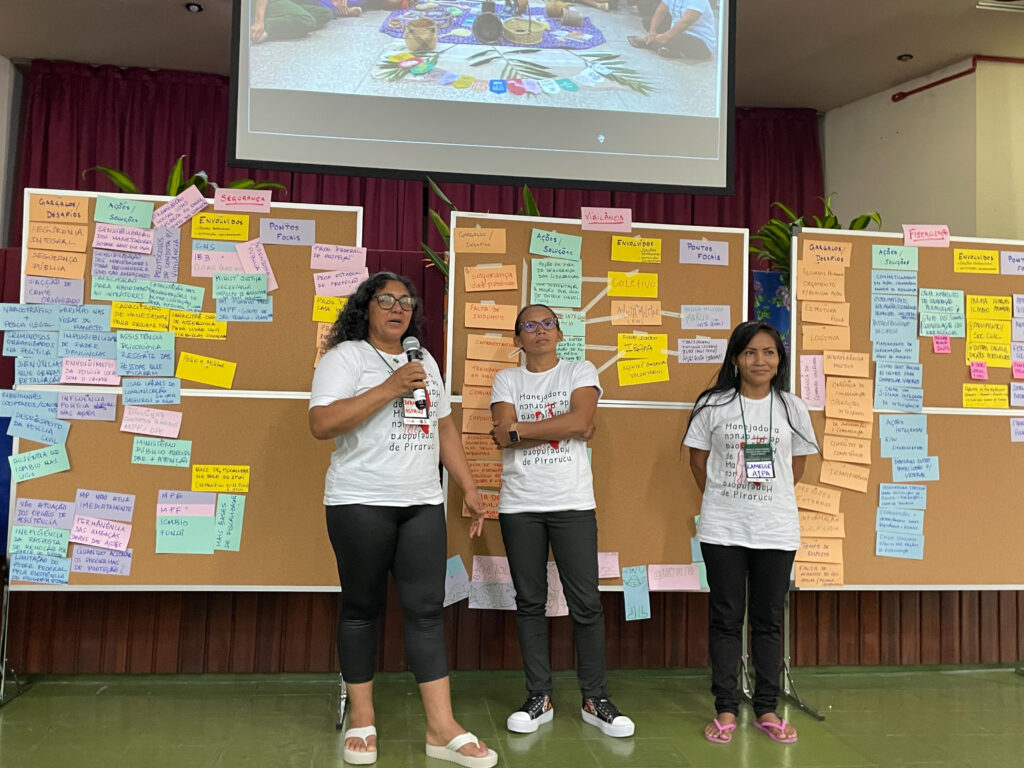A meeting of the women’s manejadoras de arapaima in the Amazon river which discusses gender equality, the activity of
Representatives from different areas gathered to discuss issues of gender in the production chain of the pirarucu fish; the Meeting was part of the program to celebrate the 25 years and for the sustainable use of the fish
By Nathália Messina e Maria Cunha | Instituto Juruá
In the month of June this year, in addition to the World Environment Day, it was also launched on the celebration of the 25th anniversary of the implementation of the sustainable management of arapaima in the Amazon river. They are 25 years old, a story filled with significant achievements, achieved by the continuous effort of the people of the waters, the forests, and their allies. The first celebration was designed by the Brazilian Institute of Environment and Renewable Natural Resources (Ibama) and the Institute for Sustainable Development in Mamirauá (dme files) and with the support of the OPAN, members of the Coletivo do Pirarucu.
In the middle of the journey of history, the fight for women’s manejadoras de pirarucu has been gaining prominence over the past few years, and resonate with your voice, hands, and hearts. Even though they face the challenges of a world of its work, the setting of the value of women in the economic activities of the management of the pirarucu, is going on. A survey led by Carolina de Freitas , published in 2020, he revealed that, as a community, rightly dividing the arapaima has a 77% chance of the reward of the women in the fishery, that number drops to 8% of the fishing communities, where there is not the situation.
Another research carried out by the year 2022 by the Association of Women’s Agroextrativistas of the Medium-Early (Asmamj, The Early and partners points out that 38 percent of women and 38 percent of the men in the extractive industries of the Middle-Early disagree with you completely on the claim that both of these genres have certain skills and capacities of the same in order to develop the activities related to fish. However, the same study states that women are significantly present in almost all of the links in the chain, including the step of capturing a fish in the water, and that’s more important to keep an eye on the stage of processing of the caught fish. That is, women are actively participating in, and they are skilled at fishing, but you still do not receive the proper recognition for it.
In light of these and other studies, and the management of shared fisheries resources, with a focus on the management of the pirarucu, is a major driving force for the empowerment of women in traditional communities in the Amazon region.
To strengthen the identity and networks by
In the context of a history of more than two decades of struggle, and the recognition, in the group of the Arapaima, which is made up of various profiles, and organizations to discuss the guidelines are important in the management of, he formed a working group (WG) on November 2023, called the ‘ GT-Gender, Youth, and at-grade Intersections to bring attention to diversity in management, with a focus on women, youth and other social groups that are invisible.
The first step of the strategic articulated by the WG is committed efforts of the group of women, through a ‘Meeting of the Women’s Manejadoras de Pirarucu: Strengthening Identities and Networks‘, which took place in the 8th and 9th of June in the city of Manaus, such as the opening of the 11th Meeting of the group of the Pirarucu, from 10 to 12 June, which was part of the “Workshop of Community Surveillance and enforcement in the areas of management of arapaima in the Amazon river,” and culminating with the celebration of 25 years of forest management in the brazilian Amazon from the 13th to the 14th of June, with the participation of the women, from the beginning to the end of the event.

In the event you had a schedule that allowed us to have an intense process of learning and the exchange of experiences and the creation of links. “I’m too fed up to expectations. I’m pretty sure that the women manejadoras have a group that you can look out for and help in the empowerment, if you want to create a future that will be able to bring appreciation for the work of all of us, women and young people”, expressed a Vania da Silva, de Souza, in the Community of the Japurá, the region of the Middle State.

In addition to the dynamics of the integration, and reception, and the promotion of trust and confidence for public speaking and debate, one of the activities at the Meeting touched on a participatory approach on which it is empowering and desempoderamento of the community, which has been adapted by Anna Luiza, Violato the Sword, and the us Forest Service (USFS), in the context of the women’s manejadoras de pirarucu. From this point on, it was also possible to identify the perception of the identity of the women who will run the pirarucu, and the role of gender, that is, in practice, it has been assigned in the supply chain.
A lecture by Dr. Dra. Edna Alencar (federal university of para Federal University of Pará and the dme files), entitled “the Fisherwomen craft, and the social management of the fish in the Amazon: the income and conservation, and environmental resilience”, he also wrote the programme of the meeting. They were presented with the socio-demographic data of the 192 fisherwomen manejadoras, in addition to further research of my own and from the experts in the various on the invisible history of women in the fisheries sector.
“I’m leaving you fully replenished from the knowledge of a really good women-it can make a huge difference in the home and I want to pass on to them that you can occupy larger spaces and to strengthen further,” says Kamelice the Paumari, the Association of the Indigenous People of the Water, (Aipa), the Land of the Indigenous Paumari of the Tapauá River.
Next steps
Continue, the group will follow the meeting on a monthly basis in the form of remote working strategies, and actions that cross in the framework of the Collective, in the quest for gender equity in the management of the pirarucu, with the initial focus on the advancement of women, and, subsequently, the activity is directed to the commission, and any other gender identities.

“I now have a fully reinforced to cope with more power and the challenges that I deal with in my neighborhood, my community, and in the management of the pirarucu fish, for being a woman, almost alone in representing the working women of the chain, in the community,” said Ivaneide Souza Lima, in the Community of the same name, RESEX Down Early.
The event was organized by the Collective of the Pirarucu, by the middle of the working group of Gender, Youth, and at-grade Intersections, and it had the support of the us Forest Service (USFS) and the U.s. Agency for International Development (USAID), which acts to support and strengthen the value chain and to the people of the Amazon for more than a decade ago.
